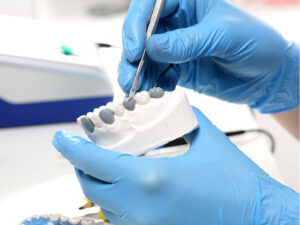Highly recommended solution for addressing missing teeth.
Pleasing solution for replacing missing teeth and restoring oral health and function.
What is Dental Implant
A dental implant is a surgical component that interfaces with the bone of the jaw or skull to support a dental prosthesis such as a crown, bridge, or denture. It serves as an artificial tooth root, providing a stable foundation for replacement teeth.
Causes for Dental Implant Treatment:
- Tooth loss: Dental implants are often used to replace missing teeth due to decay, gum disease, or trauma.
- Improved stability: For individuals with loose-fitting dentures or bridges, dental implants can provide increased stability and functionality.
- Enhanced aesthetics: Dental implants offer a natural-looking solution for restoring a complete smile and facial appearance.
Consultation:
During the consultation for dental implant treatment, the dentist will:
- Conduct a comprehensive oral examination, which may include X-rays or CT scans to assess bone density and the condition of surrounding teeth and tissues.
- Discuss the patient’s medical history, including any underlying health conditions or medications that may affect the success of the implant procedure.
- Develop a personalized treatment plan tailored to the patient’s specific needs and goals.
Available Treatments:
The dental implant procedure typically involves several steps:
- Surgical placement of the implant: The dentist surgically inserts the implant into the jawbone, where it integrates with the surrounding bone tissue through a process called osseointegration.
- Healing period: Over the next several months, the implant fuses with the bone, providing a stable foundation for the prosthetic tooth or teeth.
- Placement of the abutment: Once osseointegration is complete, an abutment is attached to the implant, which serves as a connector for the prosthetic tooth or teeth.
- Fabrication and placement of the prosthetic tooth: A dental crown, bridge, or denture is custom-made to match the color, shape, and size of the natural teeth and attached to the abutment, completing the restoration.
In some cases, immediate loading implants may be used, allowing for the placement of a temporary restoration on the same day as the implant surgery.
Aftercare:
After dental implant treatment, it’s essential to follow your dentist’s instructions for aftercare, which may include:
- Practicing good oral hygiene by brushing and flossing regularly to prevent plaque buildup and gum disease.
- Avoiding hard or sticky foods that could damage the implant or surrounding tissues.
- Attending follow-up appointments with your dentist for routine check-ups and maintenance of the implant and prosthetic teeth.
Advantages of Dental Implant Treatment:
- Improved oral health: Dental implants help preserve bone density and prevent the shifting of adjacent teeth, promoting overall oral health and function.
- Enhanced aesthetics: Dental implants provide a natural-looking and permanent solution for replacing missing teeth, restoring confidence in one’s smile and facial appearance.
- Increased comfort and stability: Unlike traditional dentures or bridges, dental implants offer improved stability and comfort for speaking, eating, and chewing.
Disadvantages of Dental Implant Treatment:
- Cost: Dental implant treatment can be more expensive than other tooth replacement options, although it is often considered a long-term investment in oral health and function.
- Time commitment: The dental implant process typically requires multiple appointments over several months, including a healing period for osseointegration.
Photos:
Dental Implant FAQ
With the use of local anesthesia and sedation techniques, dental implant surgery is generally well-tolerated and associated with minimal discomfort during the procedure.
With proper care and maintenance, dental implants can last a lifetime. However, regular dental check-ups and good oral hygiene practices are essential for ensuring the long-term success of the implant.
In some cases, patients with gum disease or insufficient bone density may still be candidates for dental implants. Additional treatments such as bone grafting or periodontal therapy may be recommended to improve the success rate of the implant procedure.
Yes, dental implants can be used to support individual crowns, bridges, or dentures to replace multiple missing teeth, providing a stable and natural-looking solution for restoring a complete smile.
Conclusion:
Dental implant treatment offers a durable and aesthetically pleasing solution for replacing missing teeth and restoring oral health and function. With advancements in dental technology and techniques, dental implants have become a widely accepted and preferred option for tooth replacement. If you’re considering dental implant treatment, consult with a qualified dentist to discuss your options and develop a personalized treatment plan tailored to your needs and goals.
Services
Specialists







